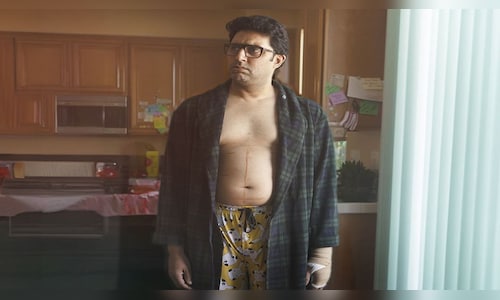
In a world obsessed with hyper-productivity where our feet are hard-pressed on the accelerator at all times, a movie flitting between diagnoses, diseases, scans and surgeries is so rare, it almost feels like a privilege. Written by Ritesh Shah (screenplay and dialogue), I Want to Talk revolves around Arjun Sen (Abhishek Bachchan), a marketing honcho living the American dream in the sunny, spacious California until he coughs up blood mid-presentation one day and his world changes forever.
Diagnosed with laryngeal cancer, he’s told he has fewer than 100 days to live. But the thing with Arjun is, he is a master-maneuverer. Some—like his surgeon (Jayant Kripalani)—may call him manipulative, but Arjun knows how to get what he wants. After a good cry and a few days of home-rotting, he decides he would let death win only once. It is in this quest that he gives his life as many chances it needs.
I Want to Talk could have been lazy, uncaring. Like the recent Srikanth and countless other Hindi films, it could have easily made the blunder of devolving into a saccharine, mawkish, hyperbolic, inspirational sob-story. But like Arjun, the telling of his tale has no time for pity, sympathy, or Bollywood-esque life lessons. This is Shoojit Sircar’s version of Anand (1971) and Kal Ho Naa Ho (2003)—a sharper, muted, no-nonsense, layered update.
It is curious how in a film titled I Want to Talk, it is silences that speak the most. George Joseph’s gentle background score ebbs and flows throughout the 122 minutes as though it were life itself, unpredictable, free-flowing, a window opened, illuminating a dark corner. I Want to Talk has the same soul as some of Sircar’s best work. Quiet, unassuming, meditative, and strong-willed, it borrows fragrances and echoes from Vicky Donor (2012),
Piku (2015), and October (2018).
In observing the fragility and the resilience of the human condition, the film delicately explores—but does not try to untangle—complicated cobwebs. Loneliness, post-diagnosis depression, the toll that divorce takes on children, the need to have difficult conversations, the trickiness of father-daughter dynamic, the clinical nature of medical professionals/procedures, the not letting your ailments become your entire personality, the burden of caregiving, and how those who are always available to help sometimes need it the most, Sircar does not shy away from putting any of it under his microscope.
Neither does Bachchan. He bares it all. The performance of a lifetime, it has him shed all vanity and be vulnerable in front of the camera in a way he never has before. He is usually good in roles that require him to be restrained, but I Want to Talk’s Arjun Sen is the classic case of the right role at the right time. Bachchan grounds him in his hulking physicality so fully that it is impossible to imagine anyone else being Arjun.
In one scene, Arjun’s doctor compares him to the duffle trolley bag that he carries to the hospital for every surgery. By the twentieth, it’s bruised and battered, but still functional. This holds true for Bachchan too. Like Arjun, he’s had to face many curveballs. Some have hit him right in the face but he’s always stood back up. Arjun rejects labels, so does Bachchan. Both of them are bent on creating their own narrative, refusing to be governed by popular perception. In spite of being a marketing guy, Arjun doesn’t advertise his illness. In fact, he’s so self-sufficient, people around him doubt his being sick. Despite provocation, Bachchan does not make public his inner turmoil either.
The support cast is solid, much like every other thread holding together this tender film that feels like a breath of fresh air in a cinematic landscape overrun by violence. But Johny Lever and Ahilya Bamroo deserve a special mention. As Arjun’s handyman, Lever has only a few scenes but he doesn’t fail to create a lasting impact. It still escapes me why Hindi cinema is sitting on a live-wire performer of his incredible calibre. Bamroo is charming, arresting as Arjun’s teen daughter Reya trying to get to know her father better.
It’s a true-life story but even if he wanted to, Sircar couldn’t have based I Want to Talk in India. If at all, such medical excellence and care is only possible in the developed nations far, far away from the geographical and financial reach of most Indians. Had he tried to set it up in India, it would have been a painful (pun intended) horror-comedy with Arjun dead in the opening scene.



